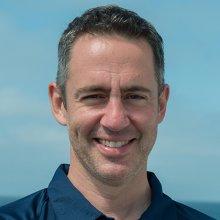
Donald Blair
Tell us about your work / research. What kinds of things do you do?
I'm focused on developing and applying open source tools (hardware / software) in scientific research, and finding ways of making it easier for scientists and non-scientists to share and analyze information. In the past, I've working on open source data loggers for rivers for monitoring pollutants, and on technology for small-scale farming. Part of the process is figuring out how to make various technologies 'talk' to one another, and designing devices so that they're easy and inexpensive to deploy and produce. The most exciting part is testing the technology in the field with people -- being out in a river or in a field and trying to make the darn things work.
What sparked your initial interest in your career?
I'm trained in physics and biophysics. Some friends and I, when frustrated with their proprietary laboratory equipment, were starting to build custom hobby electronics systems to solve research problems. We started sharing designs with other researchers, and there was a lot of interest in this 'open source' approach. I'm now very excited about how much more quickly research can sometimes move forward when people are exposed to open source tools.
Who influenced you or encourages you the most?
The open source hardware community, and the friends of mine who are connected to it, have been really inspiring for me.
What element of your work / study do you think is the most fascinating?
I find that it's really fun tools to solve problems while trying to apply a 'minimalist' aesthetic -- what is the simplest, least-expensive technology for solving this problem? Coming across a really elegant solution -- one that seems like it might help a collection of people do new science -- feels really good.
What other jobs led you to your current career?
I spent many years doing physics research in a place with lots researchers and students from all over the world. Many people I worked with came from places that didn't have large science budgets for the sort of work that they were passionate about doing, which forced them to switch to other fields. This issue was one of drivers of the 'open, accessible' technology projects that began to catch my interest -- the idea that if we could replace more expensive proprietary solutions with open, inexpensive technology, a lot of these friends could suddenly do research that was previously unavailable to them.
What are your degrees and certifications?
BA Ancient Philosophy, UMass Amherst; MS Physics, UMass Amherst
What are your hobbies?
I like reading philosophy & sharing crazy ideas about metaphysics with my friends.
What advice would you give to someone who wants a career like yours?
It's easier than ever to dive into DIY technology -- the tools and the materials have become very inexpensive, there are tons of tutorials online, and the communities of support are large and very welcoming. I'd suggest finding the nearest 'maker/hackerspace' and starting to hang out there -- there are always very interesting characters in these spaces, with fantastic and inspiring project ideas -- lots of exciting new things to try!
How did you get involved in the Nautilus Exploration Program? How did you get on the ship?
I responded to a request from Katy Croff Bell, in her capacity as Director's Fellow at MIT, to brainstorm around new technologies for deployment on the Nautilus.
Expeditions
Donald participated in the following Ocean Exploration Trust expeditions:
